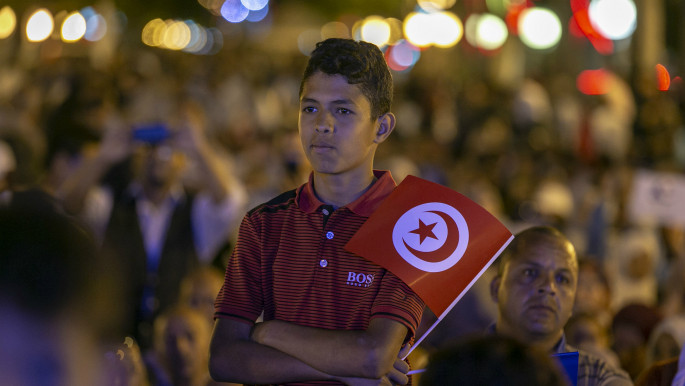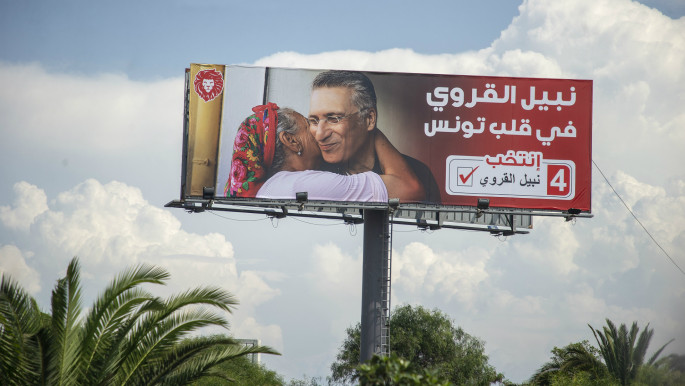'Champion of Tunisia's poor' Nabil Karoui out of jail just ahead of presidential run-off
A Tunisian appeals court ordered media mogul Nabil Karoui to be freed from prison four days before Sunday's second-round vote, as preliminary results for the legislative elections put his newly founded party in second place.
The 56-year-old businessman, who was placed in pre-trial detention in August on money laundering and tax evasion charges, weeks before the presidential vote, spent the entire campaign period for the first round of the election in prison. Despite that, he was allowed to run for president since he has not been convicted, and came second in last month's first tour.
Together with his party, Qalb Tounes, he had been pressing to be set free so he could campaign and compete on equal terms with his rival, 61-year old independent law professor Kais Saied.
Interim president Mohamed Ennaceur recently said Karoui's detention and inability to campaign had damaged the election's credibility. Election watchdogs had called for his liberation arguing there could be no fair vote if he was imprisoned.
"His release saved our transition and the situation at the last moment ... We were in a very difficult moment in Tunisia which really threatened Tunisian democracy," Karoui's spokesman Hatem Mliki told the media.
His campaign insists there is not enough time to ensure equal opportunity in campaigning. His defence legal committee initiated an appeal to postpone the presidential run-off which is scheduled for October 13.
"The court decision restores the normal course of these elections. We want the electoral race to take place in an environment of equal chances," commented Sadok Jabnoun, a member of Karoui's campaign team as well as of Qalb Tounes' political bureau.
"But the time frame is not sufficient to run a campaign properly," he added saying the team had requested voting to be delayed for a week.
 |
|
| Read also: Upcoming legislative elections will set Tunisia's future political path of action |
The Independent High Authority for the Elections (ISIE) rejected the request to delay the election date.
"Putting off Sunday's polls is practically and constitutionally impossible," Farouk Bouasker, an ISIE member, stated.
"We must abide by the October 23 deadline when the acting president's mandate expires. Any delay will take us out of the mandate period".
The Tunisian constitution requires an interim president to serve for a maximum of 90 days.
The election was brought forward after the death of late president Beji Caid Essebsi in July.
 |
Competing candidate, Saied, had refused to conduct his campaign as long as his opponent was in jail in attempt to avoid claims of unfairness |  |
While the election commission said clearly from the beginning that there was no equality of opportunity while one of the contestants was detained, with Karoui out of prison the commission believes they have a chance to ensure both candidates contest equally.
Campaigns for the second-round presidential election were almost non-existent as the competing candidate, Saied, had refused to conduct his campaign as long as his opponent was in jail in attempt to avoid claims of unfairness.
 |
|
| Read also: Nabil Karoui heads for run-off in Tunisia presidential election despite judicial impasse |
Despite his liberation, the media magnate is still facing charges.
It is not clear when a final verdict will be made in the case which was brought three years ago by I Watch, an anti-corruption watchdog.
Karoui and his campaign have denied the allegations against him claiming that that the corruption investigation is a "politically motivated smear campaign".
Karoui's release on Wednesday has revived the election scene in an accelerated 48-hour campaign that sees two completely different contenders vying for presidency.
The formerly imprisoned candidate, a business tycoon, owns the private Nessma TV station and a charitable foundation that focuses on alleviating poverty, a cause also taken up by Nessma which broadcasts footage advertising his own philanthropic work.
Karoui's supporters see him as a secular, liberal champion of Tunisia's poor whereas his critics regard him a corrupt, ambitious populist.
 |
Karoui's supporters see him as a secular, liberal champion of Tunisia's poor whereas his critics regard him a corrupt, ambitious populist |  |
Although he was unable to campaign in person during his detention, his campaign was active across Tunisia. His political party finished in second place in last Sunday's parliamentary polls.
The law professor has no political party, he ran his campaign with little funding. He is open about his conservative views against homosexuality and equal inheritance for men and women, and in favour of the death penalty. He is committed to eradicating corruption, cronyism and privilege, as well as decentralising power. He has the support of the Muslim Ennahda party and some secular, left-wing groups.
Several analysts appear to be confident that Saied would win with recent surveys suggesting the same.
Many voters who are opposed to seeing Qalb Tounes gain more strength may choose to vote in Saied's favour. Other opponents may feel more pushed to vote in support of the retired professor.
"Karoui walking free from jail may actually cause a backlash. Those who were hesitant about Saied may now be willing to vote for him, fearing to see someone with a highly shady profile elected," Tarek Kahlaoui, a political analyst and assistant professor of history at MSB.
He pointed to "shady affairs" in which the tycoon has been involved, referring to the more recent legal row over disputed work allegedly conducted by a Canadian lobbying firm to help him get elected.
Karoui's lawyers have denied any connection with the $1 million lobbying contract taken out on his behalf, however the firm's head said he was hired to secure his election. The latest controversy looks set to overshadow Sunday's vote.
On the other hand, some observers suggest that freeing Karoui could affect the dynamics in the second part of the presidential race as more of his partisans may be more interested in casting their ballots because they see he has more chances to become president outside prison.
Most electors siding with the powerful businessman consider him as a victim of the state, which could help garner additional electors by Sunday.
Some supporters of secular parties such as Nidaa Tounes and Tahya Tounes may decide to vote for him as they perceive Ennahda and Saied as a danger to their social and economic interests.
Tunisia's electoral body has anticipated that Karoui could appeal against the result if he loses since he had been denied equal opportunity to communicate with voters, and that the result could be invalidated.
"He has the right to appeal against the result. But at that point, the final decision will be in the hands of the justice system and we at ISIE will have to respect and accept it," Bouasker pointed out.
Kahlaoui is almost certain that, in case of defeat, Karoui will appeal against the results of the second round and may also "question the legitimacy of the whole electoral process".
Though no polls have been published since before the election period, Saied earned 18.4 percent of votes in the first round three weeks ago while Karoui got 15.6 percent.
Both presidential hopefuls have presented themselves as political outsiders.
The winner on Sunday will be appointed for a five-year term. Tunisia's president has control over defence, foreign policy and national security.
Alessandra Bajec is a freelance journalist currently based in Tunis.
Follow her on Twitter: @AlessandraBajec





 Follow the Middle East's top stories in English at The New Arab on Google News
Follow the Middle East's top stories in English at The New Arab on Google News


